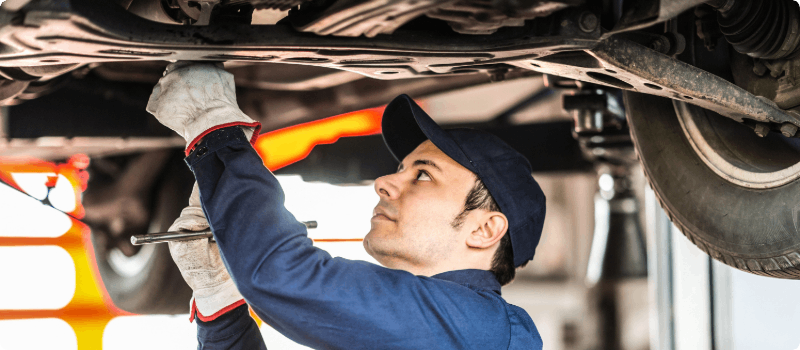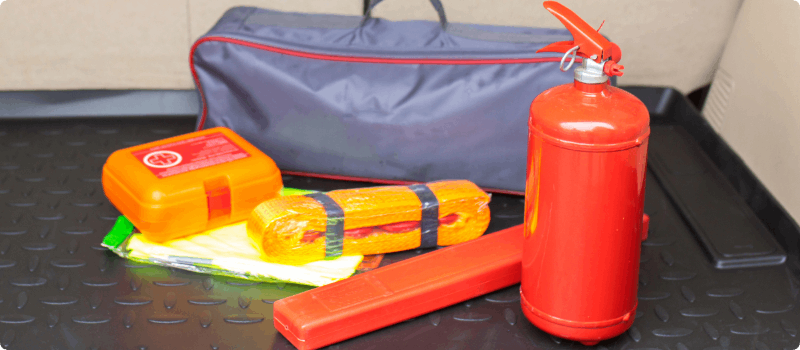Your road trip checklist
Updated January 31, 2025 . AmFam Team
You work hard at your job to provide for your family, and you save up your vacation time so you can hit the road with them. There’s nothing better than exploring the world together and making great memories . But the pre-vacation excitement can quickly fade if you haven’t prepared properly.
That’s why we’ve come up with some tips to make your car trip as fun and memorable as the sightseeing itself. Read along, learn what essentials to pack for your summer road trip and be ready for the road ahead!
Road trip car checklist
Without a car built to handle all your passengers, your luggage, and the long ride ahead, your vacation could be over before it ever gets a chance to begin. Make sure your ride is up to speed with these pre-road trip car maintenance tips:
Check your oil
Your oil lubricates your engine, so friction and heat don’t cause more wear on it than necessary. Even if you’re great about taking your car in for a regular oil change or changing it yourself, always give it a good look before you hit the road for a long trip. Pull the dipstick out while the engine is cool, grab a paper towel, wipe it off and dip it again. If it’s low, refill it to its maximum level. While you’re at it, check out the transmission and transmission fluid levels, too.
Don’t forget to check it at other points during your road trip and when you get back home — that long trek across the country can quickly deplete fluids.

Top off engine coolant
Antifreeze only needs to be topped off every once in a while — but that doesn’t mean it isn’t important. When your engine coolant breaks down, your engine can get too hot and become much more susceptible to damage. Check your owner’s manual for details on the type of coolant your engine needs.
Scan the hoses and belts
Everything under your hood is exposed to the extreme heat that your engine produces — and the belts and hoses that keep your engine running smoothly are no exception. Check them and make sure they aren’t showing excessive signs of wear or obvious damage.
If you’re comfortable and experienced in performing routine maintenance on your car, consider keeping a hose patch kit in your trunk. Just make sure your engine and all its components have cooled and are safe to be worked on before you go in to fix the issue.
Check your brakes
The safety of your passengers depends on your brakes. Look carefully at your pads and reference the manufacturer’s recommendations for when they should be replaced. Make sure the brake fluid doesn’t have a rusty appearance, and check to see if you’re due to have this fluid flushed.
When you’re driving, get a feel for how far you must push down on the brake pedal for the car to slow down and listen for any uncommon sounds that might indicate rotor or brake pad wear.
Test the tires
Check your tire pressure and treads to make sure they’re ready to put on a lot of miles. Adding a tire gauge to your car kit is a good idea, but if you don’t have one, most gas stations will have one you can borrow.
Pay attention to low pressure indicators on your dashboard if your tires are equipped with pressure sensors stems. Inflate your tires to their recommended PSI and don’t go over — be sure to check out our tips for avoiding a flat tire.

Check your windshield
Verify that your windshield wiper blades are working efficiently, and make sure your windshield fluid level is topped off. Streaky and squeaky wiper blades are more than just annoying — they can be dangerous if they aren’t efficient in helping wipe away snow, water or even dust that can hinder visibility.
Take a good look at the battery
Inspect your battery and make sure there’s no obvious corrosion. You might want to have a mechanic check the voltage. Even if your battery is brand new, you’re going to want to make sure you’ve got jumper cables in your emergency kit just in case you need to jump start your car.
Clean and detail your car
Long road trips mean you’ll be spending a lot of time in the car. Start off on the right foot with an interior that feels clean and comfortable. Spend a few hours wiping down surfaces and interior windows — nobody wants to go along for a ride with to-go cups and wrappers crowding their feet!
Review car seat installation
If you'll be traveling with little ones in car seats, take a few moments and check the physical connections between the car seat and it's the anchors that keep it in place. Be sure the child safety restraint seat is secured tightly to the car, adjusting the car seat as necessary. Take a look at our tips on car seat safety to help keep your precocious cargo safe on the road ahead.

Keep an emergency kit
A hose and belt patch kit isn’t the only repair kit you should keep in your trunk. Keep jumper cables, reflectors, motor oil, blankets, a basic toolbox, ice scrapers, bottles of water and non-perishable food in your trunk to keep your family safe while you call for assistance.
Don’t forget the first aid kit
You already put together an emergency kit for the more serious issues that might come up if your car were to have a mechanical issue, so create a car safety kit that has all the supplies you’ll need for more minor mishaps and accidents along the way.
Consider accommodation coverage
If something does happen to your vehicle while you’re on the road, you’ll be left with a whole host of issues in addition to getting your car fixed. With American Family’s road trip accommodations coverage, we’ll help with the cost of finding lodging, food expenses and alternate transportation if your vacation hits an unexpected bump in the road.
Road trip essentials
Now that the car is in tip-top condition and you’re prepared for any minor mechanical issues, it’s time to make sure you’ve got everything you’ll need. If you’re wondering what to pack for a road trip, start with the following everyday items. These road trip essentials for adults will help keep you and your family safe, happy and healthy during your trip.
- Reusable water bottles
- Healthy mess-free snacks like nuts, grapes, string cheese or baby carrots
- Cooler for beverages
- Travel pillows and blankets
- Anti-inflammatory medication
- Sunscreen
- Toiletries
- Hand sanitizer
- Sunglasses
- Travel apps to help with directions, food options and lodging
Road trip must-haves for kids
With your key road trip essentials packed away, it’s time to focus on keeping your passengers busy and engaged while in the car. Consider helping your kids pack their easy-to-access travel bags with these items:
- Books and activity books
- Travel journals
- Crafting and coloring projects
- Travel-safe toys
Road trip necessities to keep everyone entertained
There are plenty of fun road trip essentials for the whole family. Here are some more ways you can avoid the countless groans of “Are we there yet?”
Utilize technology
In moderation, tech is a great way to keep everyone relaxed and occupied while in the car. Consider bringing the following:
- Movies or shows downloaded to smartphones or tablets
- Handheld video games
- Audiobooks or podcasts for the whole family
- Portable chargers and charging cords for all electronics
Prepare your soundtrack
Nothing makes time fly when you’re on the road like the right playlist. Whether you’re singing along or tapping to the beat, music can get you in the right mood for your next destination. Just remember to keep the volume low enough to listen for environmental noises like honking horns.
Need some inspiration? Check out our Road Trip Essentials playlist on Spotify.
Play car trip games
Try putting the devices aside after a while and play some good, old-fashioned car games. The alphabet game (Opens in a new tab), 20 questions and finding state license plates are classics that are great for passing time. Put together your own version of road trip bingo based on the sites you plan to see to keep everyone involved.

Tips for a stress-free road trip
Traveling for long periods of time in your car can be stressful. Thankfully, there are easy things you can do to remain calm and keep everything you’ve packed organized. The fewer things you’ll have to worry about while driving, the better.
Pack smart
Load your car with the items you won’t need on the road first. Store these items in places like the back of the car or in the trunk. Place the things you’ll need and want in easy-to-find travel bags that you can stow between your feet and under the seats.
Keep your car clean
After you’ve rid your car of those old wrappers and other trash, grab some old grocery bags to make sure the garbage doesn’t pile up again. They’re easy to toss at gas stations, and chances are you’ve got them stored under your sink at home. Grab paper towels, napkins and a pack of baby wipes — to keep messes at a minimum while you’re away.
Plan for comfort
There’s no way around it — long car trips can be uncomfortable. Easy access to pillows and blankets can help make your car as cozy as possible. When it’s time for a pit stop, be sure everyone gets out of the car for a walk and to stretch their legs. Sometimes, just changing seats helps relieve some aches and pains. Plus, if you’ve noted landmarks that are along the route to your destination, those stops can be even more valuable.
Have a flexible itinerary
It’s easy to get flustered by traffic delays, road construction and extra stops — especially over a long drive. By creating a flexible plan, you give yourself room to hit the highlights and even try a few impromptu excursions. It also gives you some space to take unscheduled breaks when you need them.

Review your auto coverage today
Before you head out on the road, give your American Family Insurance agent a call to let them know your plans and to verify that your car insurance is up to date. Make sure to ask about travel insurance and emergency roadside assistance, too! You’re much better off having them and not needing them than vice versa.
With these road trip checklists, you'll be ready to enjoy your trip from beginning to end, knowing you've done what you can to help make your trip safe and enjoyable.
This article is for informational purposes only and based on information that is widely available. We believe this information is accurate but do not make any guarantees or promise any results based on this information. We are not responsible for the content of any third-party sites that may be linked in this article.


